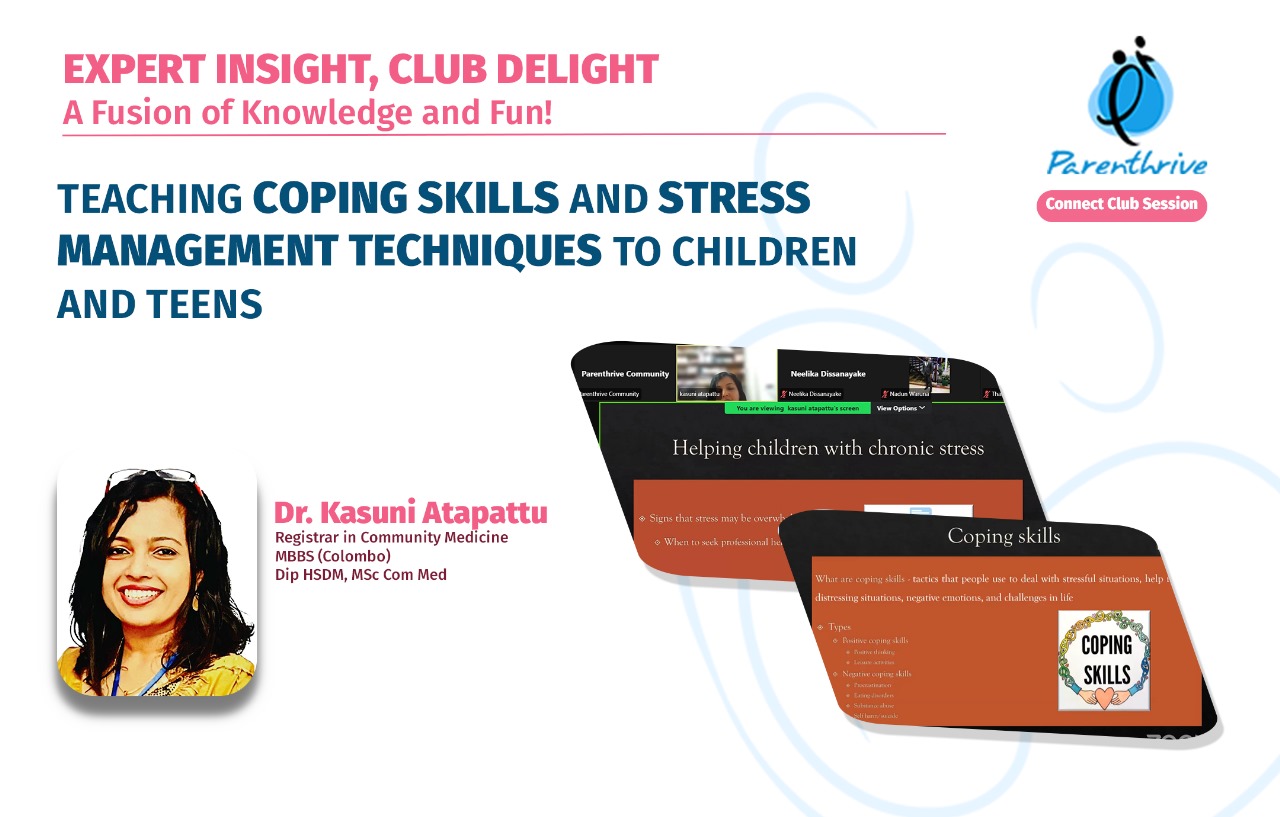
Are you concerned about your child’s stress levels and their ability to cope with life's challenges? At our recent Parenthrive session with Dr. Kasuni Atapattu, an expert in Community Medicine, we tackled this very issue, exploring practical strategies to help children and teens manage stress and build resilience. Here’s a recap of the valuable insights shared during the event.
Understanding Stress: A Biological Response
Dr. Kasuni began by explaining that stress is a natural biological response to perceived threats. When faced with a stressful situation, our body releases chemicals and hormones that help us respond, enabling us to be more alert and take action. While short-term stress can sometimes be beneficial, persistent stress can have negative health effects. This makes early stress management skills crucial for children and teens who may encounter daily stressors.
Identifying the Causes of Stress
Children today face stressors in various environments:
- At School: Academic pressures, peer interactions, and extracurricular commitments.
- In the Family: Changes in family dynamics, financial stress, and parental expectations.
- Social Life: Friendships, social media, and the pressure to fit in.
Each of these areas can add to a child’s stress levels, and recognizing these causes is a vital step in supporting children effectively.
Recognizing Signs of Stress in Children
Dr. Kasuni emphasized the importance of recognizing behavioral, emotional, and physical signs of stress in children. These can include:
- Behavioral Signs: Avoiding certain situations or activities, withdrawal from social interactions, and decreased motivation.
- Emotional Signs: Increased irritability, anxiety, and mood swings.
- Physical Signs: Headaches, stomachaches, and difficulty sleeping.
Identifying these signs early allows parents to intervene before stress becomes overwhelming.
The Health Impacts of Stress
Stress can affect children both in the short and long term:
- Short-Term Effects: Irritability, headaches, and sleep disturbances.
- Long-Term Effects: Mental health issues such as anxiety and depression, academic problems, and social withdrawal.
Understanding these potential impacts underscores the importance of teaching stress management skills to children at an early age.
The Importance of Early Stress Management
Teaching stress management equips children to handle stressors they may encounter daily, whether at school, home, or in social settings. Dr. Kasuni pointed out that managing stress effectively helps with emotional regulation, resilience, and the prevention of long-term mental health issues.
Coping Skills: Tools for Navigating Life’s Challenges
Dr. Kasuni explained that coping skills are techniques that people use to manage challenging situations and negative emotions. These skills can be categorized into:
- Positive Coping Skills: Healthy approaches that help manage stress without negative side effects, such as physical activity, mindfulness, creative outlets (like art, music, and writing), and positive self-talk.
- Negative Coping Skills: Unhealthy methods that can worsen stress, such as procrastination, substance abuse, and self-harm.
By encouraging positive coping skills, parents can help children develop lifelong habits that support well-being.
Positive Coping Skills for Children and Teens
Specific coping strategies are beneficial for children and teens at different stages:
- For Children: Physical activity, deep breathing exercises, creativity (such as drawing or music), and positive self-talk.
- For Teens: Mindfulness and meditation, talking to trusted people, time management and organization, and engaging in physical activities.
These strategies encourage children to handle stress constructively and prevent stress from escalating.
Mindfulness and Its Benefits for Stress Reduction
Mindfulness can significantly reduce stress, and Dr. Kasuni highlighted its benefits. Teaching children mindfulness practices like body scanning and guided meditation can help them remain calm and centered in difficult situations. Mindfulness exercises can improve focus, self-regulation, and emotional resilience, allowing kids to approach stress in a balanced way.
Practical Stress Management Techniques
Dr. Kasuni introduced practical techniques to help children manage stress:
- Problem-Solving Skills: Teaching kids to identify problems, brainstorm solutions, and evaluate options to make thoughtful decisions.
- Managing Academic Stress: Providing strategies for balancing schoolwork with rest, prioritizing tasks, and using effective study techniques.
- Encouraging Healthy Habits: Emphasizing the role of sleep, nutrition, physical activity, and hydration in reducing stress.
Building a Support Network and Communication Skills
Social support is crucial for managing stress. Dr. Kasuni encouraged parents to help children build a support network of friends, family, and mentors. Effective communication, such as assertive communication skills, also empowers children to express their needs and handle conflicts positively.
Role-Playing and Real-Life Application
One of the session’s interactive aspects involved role-playing exercises to practice stress management. Children can benefit from scenarios where they role-play how they would respond to stressful events, either as part of a group activity or through individual reflection. This approach allows children to apply stress management strategies in a safe, supportive environment.
Addressing Chronic Stress: When to Seek Professional Help
For some children, stress may become overwhelming, and chronic stress can have serious consequences. Dr. Kasuni advised parents to watch for signs that stress may be too much for their child to handle and to seek professional help if necessary.
The session provided parents with actionable strategies to help their children manage stress effectively and build resilience. By implementing these techniques, parents can empower their children with skills that will benefit them throughout their lives. This journey begins with recognizing stress and equipping children to handle it healthily.






